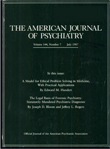Trauma and Self
This book is a collection of essays inspired by the work of Dr. Robert Jay Lifton. Emphasizing the fundamental importance of Robert Lifton's work in the area of trauma and self, the editors state in their introduction, “Any investigation of violence, trauma and survival that moves below the surface will soon encounter Lifton.” These essays address a wide variety of topics from very different perspectives, and most of them are compellingly well-written and thought-provoking. The papers are not necessarily a tribute to Lifton but, rather, provide a sample of his influence on a variety of disciplines concerned with trauma and self.
The editors have divided the book into three sections. The first one, Trauma, is composed of four papers. The lead paper, by Judith Lewis Herman, discusses the effects of violence and trauma on memory; the principal question targeted is, What happens to the memory of crime? This is followed by a paper by Betty Jean Lifton on the adoption experience. The other two essays in this section explore a psychoanalytic context for trauma.
The second section has six papers focusing on trauma and violence within a social and historical perspective. The essay by Margaret Thaler Singer, “Thought Reform Today,” which includes a very interesting discussion of thought reform (brainwashing) in cults, is particularly intriguing.
As described by the editors, the last section, Self and Transformation, includes essays dealing with “further understanding of the self in the present era.” The topics of these papers range from an illuminating discussion of the relationship between Robert Lifton and Erik Ericson to an essay on the Japanese psyche. Of these, Gerald Holton's excellent essay on whether there is a substantial postmodern turn in science is remarkably incisive.
This book offers a comprehensive collection of well-written essays, grouped in a coherent manner, that explore the interaction of trauma and self. The topics covered are surprisingly wide-ranging, but the juxtaposition of such diverse perspectives within a single volume provides an important advantage: the scope is commensurate with and thereby illustrates the range of influence of Robert Lifton's work. This book is not, and does not pretend to be, a textbook; however, this impressive collection of essays will be of interest to anyone with curiosity in the issues of violence, survival, and the self.



